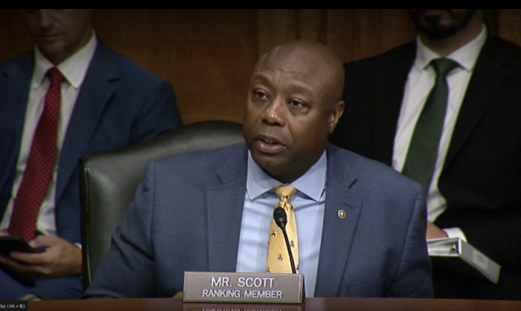Ranking Member Scott Opening Remarks at Hearing on Combating Fraud Against Seniors
WASHINGTON – Today, U.S. Senate Special Committee on Aging Ranking Member Tim Scott (R-S.C.) delivered the following opening remarks at the committee’s hearing titled “Stopping Senior Scams: Empowering Communities to Fight Fraud.”

Remarks as delivered:
Chairman Casey, thank you for working in a bipartisan fashion on so many of the issues that impact our seniors across the country. The one thing about this committee that I think all Americans can celebrate is the fact that this is a bipartisan effort to protect our seniors every step of the way, and we need more [bipartisanship] in Congress without any question. I thank you for your leadership.
I do think it's important to once again reinforce the hotline. This is the 10th anniversary of the Aging Committee's fraud hotline. The number, again, as Chairman Casey has said a couple of times, is 855-303-9470. [It is] so important for our seniors to know that there is help out there. And one of the easiest ways for our seniors to find that help is to call the hotline when necessary.
Seniors often live alone or are isolated. … I would say that when you think about the scams, the devastating effect it has on people with fixed incomes is undeniable. And it's really hard to replace income when you're on a fixed income.
On average, seniors lose about $34,200 for every instance of a scam or fraud. In 2021, according to the FTC, scammers stole $1 billion from our seniors — $1 billion. In 2021 alone, in South Carolina, South Carolinians lost $48.4 million to scams and frauds. The consequences [of] the scams and fraudsters are many for our seniors, including losing purchasing power, trying to maintain good credit, affording the cost of their homes, losing sleep. It is an absolute catastrophic experience when one experiences a scam or fraud.
Scams also have unseen consequences, leaving seniors depressed, embarrassed, and feeling betrayed. For example, Jo Saxton, a Navy veteran from Darlington, South Carolina. Last year, she received a call from two scammers impersonating law enforcement. They told her that several people in Texas had stolen her Social Security number and opened up checking accounts. And in order for her to avoid the ramifications of law enforcement, she had to send them $22,000 in cash.
And remember that this all happened over a single day. The sense of urgency and the pressure placed on these seniors to make fast decisions that have financial consequences that are devastating happen so quickly. Under this immense pressure, Jo sent two packages of cash, one to Baltimore, Maryland, the other to Little Rock, Arkansas. These people made her feel as though she had no other choice.
The scam not only put Jo in tremendous financial loss, but also caused her to withdraw from family and friends. Although frauds like the ones we'll discuss today are so common, each survivor's story is unique on how it affects their lives.
As the chairman said, we have our 2022 bipartisan fraud book, both in Spanish and English, detailing common scams and how to fight back. Identity theft was the second most reported fraud to the committee's fraud hotline. Further, this year's fraud book provides critical information and tips on how to protect yourself. According to the FTC, identify theft was the number one scam in South Carolina in 2021, with 17,642 cases. One in four identity theft victims report experiencing sleep problems, increased anxiety, depression, and anger even six months after the crime.
Scammers aren't slowing down. Since 2002, we've seen a 1,600% increase in reported scams — a 1,600% increase in reported scams. Unbelievable. In 2020, FTC reported 4.9 million scams, and in 2021, that number was 5.7 million, an 18% increase in the number. I'm thrilled that the council established by this act that Chairman Casey spoke about earlier, the Stop Seniors Scams Act, helps our seniors. And next week, we'll see the first hearing.
I look forward to hearing from our witnesses today. Thank you, Mr. Chairman. I yield back.
###